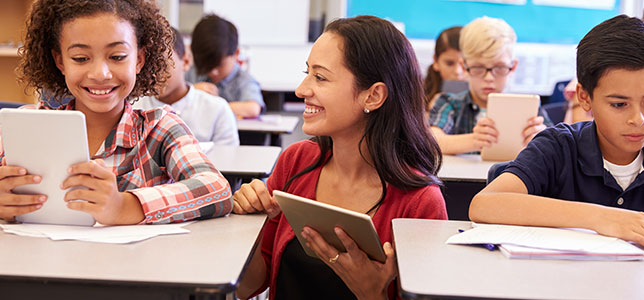The 4 Common Characteristics of Personalized Learning
iNACOL offers ideas for implementing personalized learning in K-12 schools with the support of families and the community.

Over
the last decade, technology has radically altered the way we live, work
and communicate, yet many schools continue to follow the industrial age
model of education established more than 100 years ago. Personalized
learning presents the opportunity to shift education by tailoring the learning experience to an individual student's
needs and interests while helping them gain the knowledge, skills and
experiences they need to succeed in college and career, according to a
new report from iNACOL.
The report, What’s Possible with Personalized Learning? An Overview of Personalized Learning for Schools, Families & Communities,
aims to "inform schools, families and communities about the potential
of personalized learning and empower them with ways to support the
shift to student-centered learning." To achieve this goal, the report
details the characteristics of personalized learning, presents case
studies of schools that have implemented this approach, and offers
suggestions for building family and community support for the shift.
According
to the report, there are many different approaches to personalized
learning, but most of them share these common characteristics:
- Student ownership of their learning process;
- Focus on the learning process rather than "big end-of-year tests";
- Competency or mastery-based student progression; and
- Anytime, anywhere learning.
Students
in these classrooms have the opportunity to learn in a way that suits
their individual needs and interests. While assessments are still
critical, they serve more as tools to inform the learning process
rather than a yardstick for measuring the results of that process.
Students still have clear learning goals and objectives, but the
assessments are integrated into the day and serve to determine when
students are ready to move on to the next skill or concept.
Personalized learning also involves opportunities to learn outside the
classroom or school day, through real-world experiences in the
community or digital learning opportunities.
However, schools
that implement personalized learning sometimes encounter resistance
from families or other members of the public who expect school to look
the same as it did when they were students. The report offers
suggestions for gaining the support of those individuals and groups by
educating them about the benefits of personalized learning, being
open about the changes happening in education and engaging them
in the process of transformation.
The report also includes
stories from individual students and teachers about their experiences
with personalized learning, as well as links to supporting materials
and suggestions for further reading.
The International
Association for K-12 Online Learning (iNACOL) is a nonprofit
organization focusing on research, developing policy for
student-centered education to ensure equity and access, developing
quality standards for emerging learning models using online, blended
and competency-based education and supporting the ongoing professional
development of classroom, school, and district leaders for new learning
models.
The full report is available as a free, downloadable PDF from iNACOL's site.
About the Author
Leila Meyer is a technology writer based in British Columbia. She can be reached at [email protected].